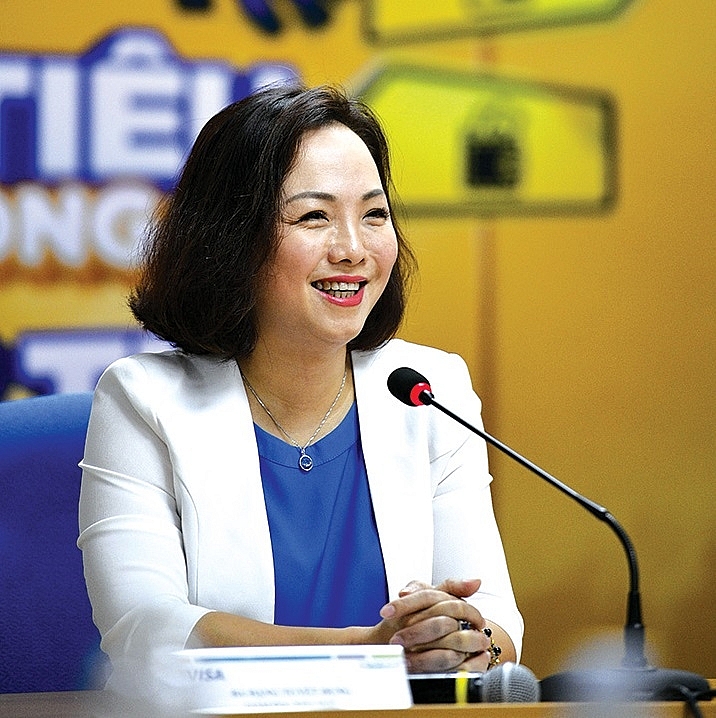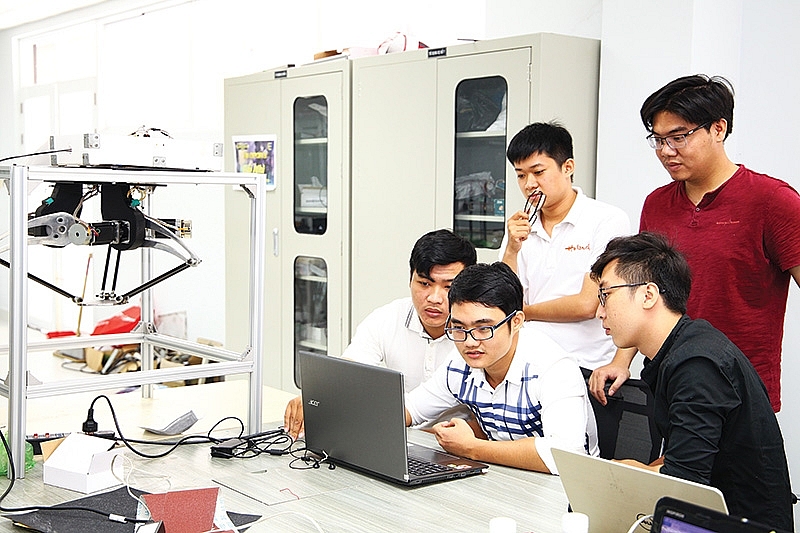Visa kits out students with financial finesse
 |
| Dang Tuyet Dung, country manager for Visa Vietnam and Laos |
Why did you choose university students as the target audience of your financial literacy education programme?
Visa believes the most important financial tool is not a product – it is knowledge. That is why Visa has been developing financial literacy programmes that teach individuals, especially university students.
The first reason is that we consider students as the ambassadors of change, and a key factor that will make a lasting impact on the programme’s development in Vietnam. These are the people that will shape the country over the coming years, and as such, it is vital that they learn these skills.
Second, the growth of electronic payments is exciting because it benefits everyone by giving them access to faster, more convenient, and more secure ways to pay. Especially, there is huge enthusiasm amongst the Vietnamese youth about technology, and many are shopping online regularly. We expect that, by the time 2020 rolls around, they will already be well accustomed to using electronic payments in their everyday lives.
Our Practical Money Skills takes a holistic approach to teaching students about budgeting, saving, and spending, and within this approach we help them understand the various financial tools that are at their disposal. Students, the young generation, are the pioneers who are willing to study, explore, and experiment with the new. With their open mind, they are always ready to experience and share their knowledge with the community.
Through the programme, we look forward to seeing students’ creativity in coming up with ways to spread knowledge and skills widely. The resources for the programme, therefore, are intended not only for university students, but also parents, teachers, students, and consumers of all ages. The materials have the capacity to provide spill-over effects throughout families, workplaces, and educational institutions.
Why did you choose this year to expand the topics that the programme touches on?
While many of the fundamentals of financial management do not change, new challenges are always emerging that can trip up even the most financially-savvy consumers. The way people conduct commerce has changed substantially over the last few years, with the rise of e-commerce and mobile commerce, mobile wallets, and so on.
With so many young people going online to do their shopping, this year, we have added some new subjects to the programme, like staying safe when shopping online and navigating contracts. It is important that they have the skills to manage their finances and spending in all of Vietnam’s increasingly diverse commercial scenarios.
This change is particularly noticeable in Vietnam, where many have transitioned from only using cash straight into using their smartphones to pay for online purchases, and card payments play a larger role in the day-to-day lives of consumers.
The fact is, many high school students now own smartphones and are engaging in digital commerce by the time they graduate. This means they are using sensitive details online in the process of purchasing things.
We are in a world now where young people need to concern themselves with more than just knowing how to budget and save, and as such, we wanted the programme to reflect these changes.
Does the government support Visa in this advocacy for students? How can you evaluate the practical and effective impacts of the programme?
The Central Committee of Vietnam Student Association (CCVSA) is a government organisation, so the government does support this work on a very direct basis. Accordingly, Visa partnering with the CCVSA launched the financial literacy programme to educate students and prevent their money from “burning a hole in their pockets.” Our 2019 Practical Money Skills programme was expanded in scope to include new topics that address the economic challenges faced by young people today.
We have also had government representatives attend many of our events, such as the State Bank of Vietnam. We are incredibly grateful for the support that we have been shown with this programme.
Furthermore, at Visa, we are consistently working with the government, our banking partners, merchants, and the public to provide useful education about banking, electronic payments, and spending wisely.
What are the underlying motivations of Visa in running the financial literacy programme for eight consecutive years now?
Visa believes that the ability to manage one’s personal finances is one of the most important skills a person can learn. Visa is committed to advancing financial literacy in local communities, with the assistance and support of financial institutions, NGOs, and policymakers.
Ultimately, Visa seeks to provide education that will assist people to achieve sustainable financial stability and security.
What kind of activities can the students take part in to promote financial literacy?
Students are free to use their creativity with virtually any medium or method to promote financial literacy. In the past we have seen students create videos, develop posters, run forums and debates, and incorporate music… there are so many ways to approach the topic, and we look forward to seeing how students work with the subject matter.
This year’s programme – the eighth annual installment – specifically focuses on addressing frivolous spending, under the theme chay tui (literally, “wallet on fire,” similar to the English phrase “money burns a hole in my pocket”). In addition to the core areas of responsible budgeting, saving, and spending, this year’s programme also addresses some emerging areas of concern like ensuring security while shopping online, what to be aware of when signing contracts, and managing credit to avoid unsustainable debt.
The format of the programme this year sees teams of three students across the country develop plans to help promote financial literacy among their peers. Teams are encouraged to engage the help of advisors, such as lecturers, business people or student leaders, in the development and execution of their programme. In the second round of the programme, the seven best teams with the best proposals will receive funding to put their plans into action. Teams will record the results of their activities, and the top five teams will be chosen to present them at a grand finale held in Hanoi, for the chance to win a number of attractive prizes.
The programme’s launch coincides with the release of an online Chay Tui Prevention Toolkit, which the students can draw on for inspiration for their projects. The kit includes eight useful tools such as: the Impulse Extinguisher to be sprayed in case of reckless spending; the Lie-Spotting Flashlight to help you be contract-savvy; and the Privacy Mask to help protect personal information when making online transactions, to name a few.
A range of programme resources are available on the programme’s Facebook page, Instagram, and YouTube to teach students the basic concepts of spending responsibly while learning to save and budget wisely. So if I can give advice to the students, it would be this: while creativity is obviously great, they need to make sure that their ideas are also practical and can reach large numbers of people.
How does this programme help the government in achieving its 2020 goal – preparing the society to substantially reduce cash usage?
In Vietnam, the main barriers to going cashless are awareness and acceptance. As cash is still prevalent, not all people are used to new payment methods.
Vietnam cannot become a cashless society if the Vietnamese people are not ready. The most important thing that we can do is to equip students and the general population with the knowledge needed to navigate the changing economy and manage their finances accordingly.
Visa is the world’s leader in digital payments. Our mission is to connect the world through the most innovative, reliable, and secure payment network – enabling individuals, businesses, and economies to thrive. Our company’s relentless focus on innovation is a catalyst for the rapid growth of connected commerce on any device, and a driving force behind the dream of a cashless future for everyone, everywhere.
In Vietnam, we are committed to working with our banking clients, merchants, and the government to expand access to electronic payments and introduce new payment technologies that will benefit all Vietnamese people. In addition, as the government plans to turn Vietnam into a cashless society, financial literacy is becoming more and more critical. Visa’s investment in the programme – including our long-term partnership with the CCVSA – demonstrates the company’s commitment to further enhancing the financial literacy of the Vietnamese people.
What the stars mean:
★ Poor ★ ★ Promising ★★★ Good ★★★★ Very good ★★★★★ Exceptional
Related Contents
Latest News
More News
- VIB named Best Customer Satisfaction Bank in Vietnam 2025 (December 26, 2025 | 16:40)
- Visa and Techcombank win AmCham’s 2025 ESG Tech Innovation Award for Eco Card (December 09, 2025 | 12:16)
- Visa brings tap-to-ride payments to Hanoi Metro Line 2A (December 05, 2025 | 17:35)
- Cross-border QR payments launched for Chinese tourists (December 03, 2025 | 19:12)
- VIB honoured by JP Morgan with 2025 US Dollar Clearing Elite Quality Recognition Award (December 02, 2025 | 17:04)
- Home Credit Vietnam brings financial literacy closer to women and students (November 20, 2025 | 11:25)
- MB partners with Visa, KOTRA to launch new MB Visa Hi BIZ card (November 20, 2025 | 11:24)
- VPBank upgrades core banking with Temenos and Systems Limited (November 14, 2025 | 17:54)
- CPO Home Credit shares how to build an AI-driven but human-centric workplace (October 30, 2025 | 09:56)
- VIB hits $267.4 million in pre-tax profit over first nine months (October 29, 2025 | 12:12)


 Tag:
Tag:



















 Mobile Version
Mobile Version